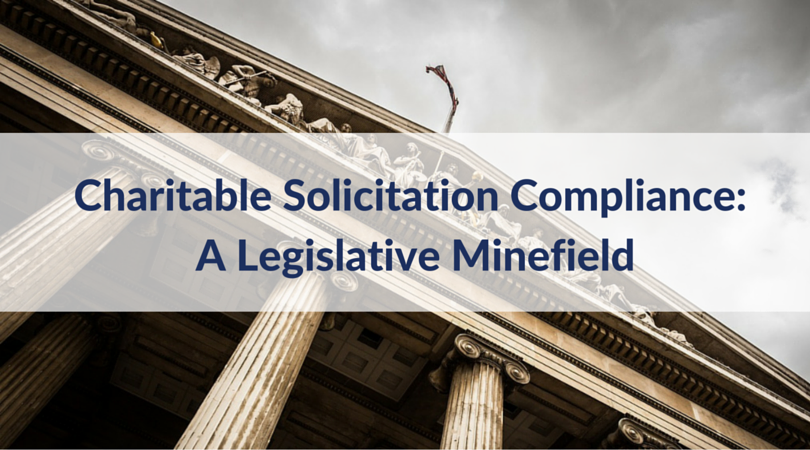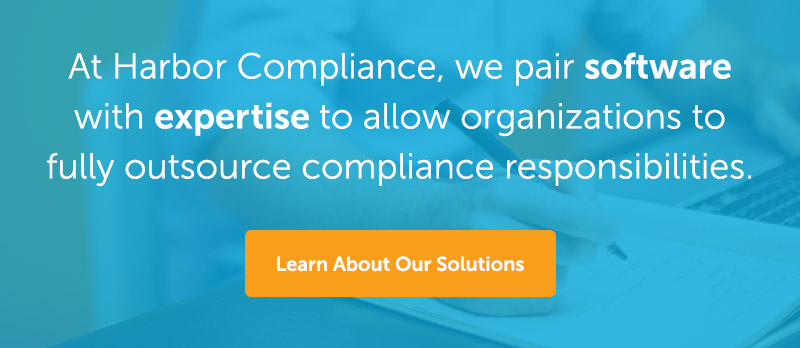-
Software
Compliance Software
Oversee licenses, track renewals, access documents, and more from a single interface.
Software Overview -
Services
Compliance Services
Full service compliance solutions for organizations throughout their entire lifecycles.
Services Overview -
Industries
-
Partner
- Information Center
Charitable Solicitation Compliance: A Legislative Minefield (Part 2)
A Series on Legislative and Administrative Changes in Charitable Solicitation Requirements
If you haven’t already, go back and read Part 1 for legislative and administrative changes surrounding foreign qualification and registered agent appointment.
Disclosure Requirements
About half of all states require charities to include disclosure statements on their solicitation materials. These short statements help donors find more information on a charity, and are often a good indicator of whether a charity is registered and compliant. Currently, a bill in the California state legislature would require every nonprofit that solicits funds in California to put a link on its home page, and print a disclosure statement on all other solicitation materials, directing prospective donors to the Attorney General’s website. There is a quite a bit of opposition to this bill, and it still under consideration at the time of this post.
The Hawaii legislature has passed an amendment to the charitable registration and solicitation law to require affirmative disclosures to donors by professional solicitors and to clarify exemptions from registration. Notably, the amendment would raise the audit requirement threshold from $500,000 in total revenue to $500,000 in contributed revenue. The amendment is waiting for the governor’s signature.
Additional Forms and Filings
Several states require additional documentation be submitted with charitable registration forms that is not listed on instruction forms. These “administrative” requirements can create long delays in the approval of charitable registration applications.
In the District of Columbia, the state’s website is a bit misleading. The DCRA requires a certificate of good standing and confirmation of state tax exemption (which is obtained by filing Form FR-164) to be submitted with initial charitable solicitation applications. Neither of these documents is explicitly listed on the website, and failure to include either one can cause a rejection. If you don’t file the BBL online, you will need to provide an original signature, as well as an original notarization on the Certified Resolution. When the DCRA takes 4-6 weeks to process the application, any missing piece can be costly.
Generally, Illinois automatically assumes that initial registrants have been soliciting funds in the state prior to registration. If your charity has solicited prior to registration, you can be expected to pay approximately $500 in late fees. If your charity has not solicited prior to registration, your application will be rejected unless you include a signed statement indicating that the organization has not solicited or held charitable funds in Illinois. Illinois currently takes nearly six months to process an initial registration application, so it’s best to include this letter and save yourself the headache later on.
Like Illinois, Pennsylvania wants to know when your charity started to solicit and to receive contributions from Pennsylvania residents. Once your charity receives $25,000 in a year, it is required to file a charitable registration application. Pennsylvania’s standard application is the BCO-10, on which you’ll tell the state exactly when you reached that threshold. For failure to register on time, Pennsylvania assesses a $25 penalty per month after that $25,000 was reached. For many new charities, this is no big deal, and they either have no penalty or just a few dollars. However, many large, established charities that have been soliciting in Pennsylvania and receiving contributions for many years can face a substantial penalty. The good news is that charities that have been soliciting in Pennsylvania for a while can file the Unified Registration Statement (URS) instead. Pennsylvania is one of the states that accepts the URS, which, compared to the BCO-10, is more vague on when the charity solicited and received contributions. Typically, state examiners will still process and accept the URS and not assess a penalty, though there is never a guarantee.
Moving Forward
It’s no secret that managing charitable solicitation compliance is a complex and time-consuming task. Our approach is to pair software with expertise to allow organizations to fully outsource the responsibilities. Regardless of what stage an organization is in, we follow the best practices we’ve learned through our extensive experience to help ensure organizations are compliant while minimizing their time and financial investment. Learn about how you can put your compliance on autopilot with our compliance solutions.







